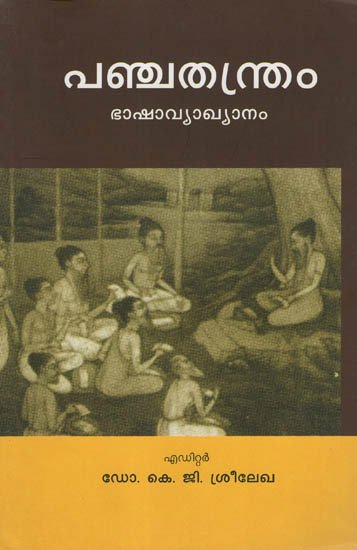Panchatantra [sanskrit]
by Dr. Naveen Kumar Jha | 2016 | 13,828 words | ISBN-13: 9788193077962
The Sanskrit edition of the Panchatantra referencing the English translation and grammatical analysis. Written by Vishnu Sharma and possibly dating as early as 1200 BCE, the Panchatantra (or Pancatantra) represents a collection of short stories teaching basic ethical values and moral conduct that was commonly practiced in ancient Indian. Alternative titles: Śrīviṣṇuśarman Pañcatantra (श्रीविष्णुशर्मन् पञ्चतन्त्र, Śrī-viṣṇuśarman pancatantra, श्री-विष्णुशर्मन्, Sri-visnusarman)
Verse 3.196
दुर्दिवसे घन-तिमिरे वर्षति जलदे महाटवी-प्रभृतौ ।
पत्युर् विदेश-गमने परम-सुखं जघन-चपलायाः ॥ १९६ ॥
durdivase ghana-timire varṣati jalade mahāṭavī-prabhṛtau |
patyur videśa-gamane parama-sukhaṃ jaghana-capalāyāḥ || 196 ||
The English translation of Panchatantra Verse 3.196 is contained in the book The Complete Pancatantra: Sanskrit Text with English Translation by Dr. Naveen Kumar Jha. This book is not available online so in order to read the full text and translation you should buy the book:
Buy now! English translation by Dr. Naveen Kumar Jha (2016)
Glossary of Sanskrit terms
Note: This extracts Sanskrit terms and links to English definitions from the glossary, based on an experimental segmentation of verse (3.196). Some terms could be superfluous while some might not be mentioned. Click on the word to show English definitions.
Durdivasa, Ghana, Timira, Timiri, Varshat, Jalada, Mahatavi, Prabhrita, Prabhriti, Pati, Videsha, Gamana, Parama, Sukham, Sukha, Jaghana, Capala,
Analysis of Sanskrit grammar
Note: this is an experimental feature and only shows the first possible analysis of the Sanskrit text (Panchatantra Verse 3.196). If the system was successful in segmenting the sentence, you will see of which words it is made up of, generally consisting of Nouns, Pronouns, Verbs, Participles and Indeclinables. Click on the link to show all possible derivations of the word.
- Line 1: “durdivase ghana-timire varṣati jalade mahāṭavī-prabhṛtau ”
- durdivase -
-
durdivasa (noun, masculine)[locative single]
- ghana -
-
ghana (noun, masculine)[compound], [vocative single]ghana (noun, neuter)[compound], [vocative single]
- timire -
-
timira (noun, masculine)[locative single]timira (noun, neuter)[nominative dual], [vocative dual], [accusative dual], [locative single]timirā (noun, feminine)[nominative dual], [vocative single], [vocative dual], [accusative dual]timiri (noun, masculine)[vocative single]
- varṣati -
-
varṣat (noun, masculine)[locative single]varṣat (noun, neuter)[locative single]√vṛṣ -> varṣat (participle, masculine)[locative single from √vṛṣ class 1 verb]√vṛṣ -> varṣat (participle, neuter)[locative single from √vṛṣ class 1 verb]√vṛṣ (verb class 1)[present active third single]
- jalade -
-
jalada (noun, masculine)[locative single]
- mahāṭavī -
-
mahāṭavī (noun, feminine)[compound], [nominative single]mahāṭavi (noun, masculine)[nominative dual], [vocative dual], [accusative dual]
- prabhṛtau -
-
prabhṛta (noun, masculine)[nominative dual], [vocative dual], [accusative dual]prabhṛti (noun, feminine)[locative single]
- Line 2: “patyur videśa-gamane parama-sukhaṃ jaghana-capalāyāḥ ”
- patyur -
-
pati (noun, masculine)[ablative single], [genitive single]
- videśa -
-
videśa (noun, masculine)[compound], [vocative single]
- gamane -
-
gamana (noun, masculine)[locative single]gamana (noun, neuter)[nominative dual], [vocative dual], [accusative dual], [locative single]gamanā (noun, feminine)[nominative dual], [vocative single], [vocative dual], [accusative dual]
- parama -
-
parama (noun, masculine)[compound], [vocative single]parama (noun, neuter)[compound], [vocative single]
- sukham -
-
sukham (indeclinable)[indeclinable]sukha (noun, masculine)[adverb], [accusative single]sukha (noun, neuter)[adverb], [nominative single], [accusative single]sukhā (noun, feminine)[adverb]
- jaghana -
-
jaghana (noun, masculine)[compound], [vocative single]√han (verb class 1)[perfect active first single]√han (verb class 2)[perfect active first single]
- capalāyāḥ -
-
capalā (noun, feminine)[ablative single], [genitive single]
Other editions:
Also see the following editions of the Sanskrit text or (alternative) English translations of the Panchatantra Verse 3.196
Pancatantra of Visnusarman
by M. R. Kale (2015)
Panchatantra in Simple Sanskrit
by Dr. Vishwas (2016)
Panchatantram (Telugu)
by Tadanki Venkata Lakshmi Narasimha Rao (2020)
Published by J. P. Publications, Vijayawada; Throughout black & white Illustrations; 9788192053851.
Buy now!Preview of verse 3.196 in Telugu sript:
దుర్దివసే ఘన-తిమిరే వర్షతి జలదే మహాటవీ-ప్రభృతౌ ।
పత్యుర్ విదేశ-గమనే పరమ-సుఖం జఘన-చపలాయాః ॥ ౧౯౬ ॥
Panchatantram Bhashavyakhyanam (Malayalam)
by Dr. K.G. Sreelekha (2010)
Published by the University of Kerala.
Buy now!Preview of verse 3.196 in Malayalam sript:
ദുര്ദിവസേ ഘന-തിമിരേ വര്ഷതി ജലദേ മഹാടവീ-പ്രഭൃതൌ ।
പത്യുര് വിദേശ-ഗമനേ പരമ-സുഖം ജഘന-ചപലായാഃ ॥ ൧൯൬ ॥
The Panchatantra Stories (Tamil)
by P. S. Aacharya (2017)
Published by Narmadha Pathippagam, Chennai.
Buy now!
Panchatantrer Galpa (Bengali)
by Children's Book Trust (2014)
Throughout color Illustration; 9788170112730
Buy now!Preview of verse 3.196 in Bengali sript:
দুর্দিবসে ঘন-তিমিরে বর্ষতি জলদে মহাটবী-প্রভৃতৌ ।
পত্যুর্ বিদেশ-গমনে পরম-সুখং জঘন-চপলাযাঃ ॥ ১৯৬ ॥
Panchatantra in Gujarati (Comic)
by Anant Pai (2013)
[શિયાળા અને રણશિંગ પંચતંત્ર] Published by Amar Chitra Katha; Throughout Color Illustrations; 9789350853115
Buy now!Preview of verse 3.196 in Gujarati sript:
દુર્દિવસે ઘન-તિમિરે વર્ષતિ જલદે મહાટવી-પ્રભૃતૌ ।
પત્યુર્ વિદેશ-ગમને પરમ-સુખં જઘન-ચપલાયાઃ ॥ ૧૯૬ ॥
![Panchatantra [sanskrit] - book cover](/uploads/a/Pancatantra.jpg)






